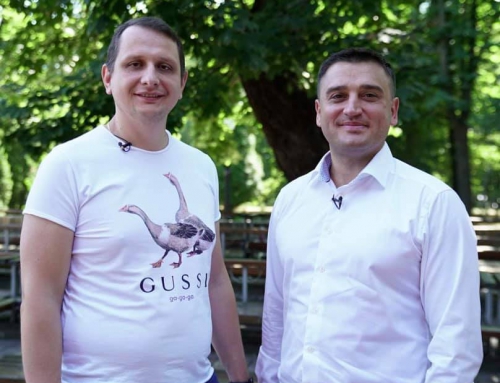In his ministry’s conference room, Alexander Bornyakov, 37, has posters of superheroes and videogame characters. But Bornyakov isn’t just a geek – he’s a serious man with a serious task.
Appointed as the new deputy minister for digital transformation three months ago, Bornyakov has already started working on his ambition to turn Ukraine into a tech nation.
The local information technology sector is growing by up to 30% each year and has become the country’s second-largest export industry after agriculture. Homegrown teams are putting together innovative products and services on a global scale.
But Ukraine’s IT can be so much more, Bornyakov believes.
He has a tech background, having founded the marketing company Adtelligent. He was a former board member at advertising platform Clickky, a former managing partner at angel seed fund WannaBiz and a former board chairman at software development firm Intersog Ukraine.
His new assignments? To increase the growth of the IT sector, which now sits at $5.4 billion; to improve its share of the economy and to increase the export of high-tech products and services from Ukraine.
Improving tech education
One major task that Bornyakov hopes to work on during his time in office is improving education. The ministry estimates that up to 40,000 IT positions remain unfilled because there is a shortage of tech specialists qualified to fill them. And that figure is growing every year.
Strong demand is “a good thing, the industry is literally booming,” he said. However, it also means that “we have a shortage of public education and private educational institutions.”
According to the deputy minister, Ukraine’s state institutions churn out roughly 70,000 IT specialists per year and private institutions produce about 15,000. This is not enough to meet demand.
The bottleneck, he said, is mainly on the public education side. Government universities are too slow in adapting to the needs of the industry. Many are stuck in old practices from before the global tech revolution and lack sufficient courses to train people quickly and effectively enough.
Private institutions are picking up some of the slack. But getting a private institution off the ground requires millions of dollars and years of working one’s way through Ukraine’s opaque and ponderous bureaucracy.
Some online courses have popped up to fill the gap. One solution would be to improve their partnership with existing schools. An example is DataRoot University, developed by two former students of Kyiv Polytechnic Institute, which now partners with it to offer data science courses.
Taxing tech specialists
Another major factor is taxes. About 9 out of 10 IT specialists are working as private entrepreneurs, regardless of whether they’re contractors or full-time employees. This is an incentive for companies and entrepreneurs alike, who can reduce their taxes and enjoy the flexibility often demanded in the IT field.
However, using entrepreneurs as employees is legally ambiguous and presents a tax risk, which deters major global players, strict on compliance, from entering Ukraine. Also, the low tax base means that there is less money to pay for expanding educational attainment to fuel the industry.
Solving this problem will be a delicate balancing game of improving how taxes are codified without driving the companies and top talent to take their business to Ukraine’s neighboring countries. Bornyakov hopes to revamp taxation to incentivize companies to employ more people as regular employees and change the structure of payroll taxes to make sure large companies pay their share — without scaring them off.
Bringing investment
Investors and tech companies say that one of the biggest limiting factors on Ukraine’s IT sector and homegrown tech companies in general is the absence of venture capital. While a shortage of venture capital is a global problem, it’s a much bigger problem in Ukraine, because the country literally has no way to create such funds.
“I found no appropriate laws for creating venture investment accounts,” said Bornyakov. “Even if you want to find funding, you have to go abroad.”
His goal will be to not only help create a framework for investment capital, but also to introduce incentives and protections against legal and financial risks, so that Ukrainian companies don’t have to register in Cyprus or the U.S. in order to receive much-needed funding.
By Igor Kossov for KyivPost








Оставить комментарий
You must be logged in to post a comment.